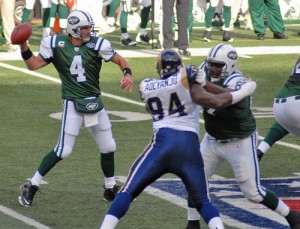 Nothing is sure in this world except death, taxes and text messages that will come back to bite you in places that will hurt.
Nothing is sure in this world except death, taxes and text messages that will come back to bite you in places that will hurt.
Right now, future NFL Hall of Fame quarterback, Brett Favre, is smarting from even the suggestion that he texted a former game-day reporter for the New York Jets (there is no verification of these stories and the investigation by the NFL is in its infancy). This news evolves as golfer Tiger Woods continues to reel from released text messages, voice mails and his eventual admission to infidelity that cost him millions of dollars in endorsements and his marriage during the past year.
My guess is that phone companies are vetting each future endorsement prospect like never before.
There is a lesson here for everyone, however: everything we record in type or voice and transmit via Internet, phone or cable, is forever traceable and transferrable. The messages are also resilient to destruction. They are the movie ticket stubs that we keep for years as mementos or prom dress that hangs in a closet decades after your big night. The big difference is that texts, emails and voice messages tell stories. There’s little to guess about what’s being communicated because it’s out there for people to read and hear if that once-special someone chooses to share what you may have assumed to be forever private.
 For athletes, texting seems to be this century’s version of drunk dialing. Remember when you had one too many after a college party, went home and picked up the phone and called your ex? In more cases than not, that call was far from your best move of the weekend.
For athletes, texting seems to be this century’s version of drunk dialing. Remember when you had one too many after a college party, went home and picked up the phone and called your ex? In more cases than not, that call was far from your best move of the weekend.
Today, those little-thought actions are commonplace among all ages. Nielson Co. recently revealed that the average 13-to-17-year-old sends and receives 3,339 texts per month. Further analyzed by the The Wall Street Journal, adults are catching up. Those in the 45-54-year-old age range shared and read 323 texts per month in the second quarter of 2010. The driving force, of course, is the mobile phone. It’s quick, and you don’t actually have to talk to the recipient. It’s changed the ways we communicate and in recent years, it’s not voice-to-voice.
Athletes, like during many other situations in which they find themselves at risk of looking bad in public and their own living rooms, should adhere to my public relations-based piece of advice: DON’T DO IT! Resist the temptation to send a suggestive message to that day’s crush. Know that any release of that, especially if it’s graphic, will come back to crush you. It will hurt your sports career, damage your marketability and may break up your home.
For whatever reason, the public loves to see a successful person fall from grace and crawl his way up again. None of these messages can ever be considered private, ever…even years later, and are fodder for that warped voyeurism.
If an athlete is single and wants to connect with a potential love interest, do it the old fashioned way. No one ever lost an endorsement deal for discretely romantically courting the person of his or her dreams.
###


[…] allegations of Brett Favre, plenty of blogs/media outlets have chimed in: USA Today, IndyStar.com, Sports Networker, The Sports Commentary, The Huddle, Seattle Times, Deadspin, Huffington Post, and […]
[…] Text Messages Aren’t Good for PR From: SportsNetworker […]